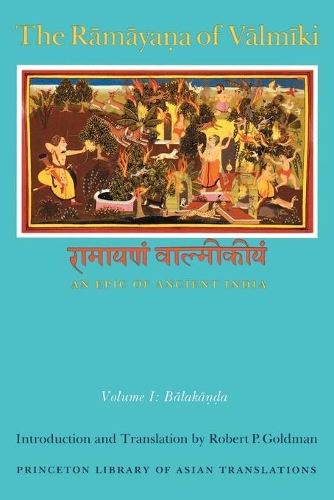
The Rmyaa of Vlmki: An Epic of Ancient India, Volume I: Balaka
(Paperback)
Available Formats
Paperback
Published: 19th June 1990
Paperback
Published: 14th November 2016
Paperback
Published: 14th November 2016
Paperback
Published: 14th November 2016
Paperback
Published: 3rd April 2017
Hardback
Published: 27th February 2017
Paperback
Published: 19th November 2018
Paperback
Published: 1st May 2022
Publishing Details
The Rmyaa of Vlmki: An Epic of Ancient India, Volume I: Balaka
By (Author) Robert P. Goldman
Princeton University Press
Princeton University Press
19th June 1990
United States
Classifications
Professional and Scholarly
Non Fiction
Sacred texts, scriptures and revered writings
294.5922
Physical Properties
Paperback
456
Width 152mm, Height 229mm
482g
Description
This is the first of seven volumes of a translation of the Valmiki Ramayana, the great Sanskrit epic of the life of Rama, ideal man and incarnation of the great god Visnu. This renowned work of ancient India has profoundly affected the literature, art, religions, and cultures of countless millions of people in South and Southeast Asia -- an influence that is perhaps unparalleled in the history of world literature. Balakanda, the opening portion of this first translation to be based on the critical edition (Oriental Institute, Baroda), is presented here in a compact volume Without the section of notes."His name is Rama and he was born in the House of Iksyaku. All men know of him, for he is self-controlled, mighty, radiant steadfast, and masterful...Eloquent and majestic, he annihilates his, enemies. His shoulders are broad and his arms mighty...His brow is noble and his gait full of grace. His proportions are perfect and his limbs well-formed and symmetrical. Dark is his complexion, and he is valorous...He is renowned, learned, pure, disciplined, and contemplative...the protector of all living things and the guardian of righteousness...He is the fie is the constant resort of good men, as is the ocean of rivers. ..The delight gifted with every virtue. For he is deep as the ocean and as unyielding as the Himalayas...Moved by affection for him, Dasaratha, lord of the earth, wished to appoint this Rama, his beloved eldest son, as prince regent..."
Reviews
"Goldman has chosen a translation style that is simple, direct, and very close to the text, without being prosaic. He has avoided the twin pitfalls of preciousness and pedantry. The Ramayana, as he reminds us, is a poem in a sense we have almost lost touch with: intended to be heard, easily understood, chanted in a loose and repetitive meter that permits the lapidary phrase."--Edwin Gerow, Journal of Asian Studies
